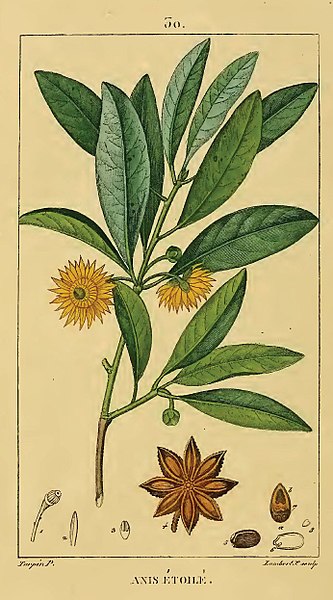Illicium anisatum, with common names Japanese star anise, Aniseed tree, and sacred Anise tree, known in Japanese as shikimi , is an evergreen shrub or small tree closely related to the Chinese star anise. Since it is highly toxic, the fruit is not edible; instead, the dried and powdered leaves are burned as incense in Japan. Its branches and evergreen leaves are considered highly sacred by Japanese Buddhists due to aversion from insects and their ability to remain fresh after pruning.
Illicium anisatum
The flowers of the Shikimi plant.
The mature leaves of the Shikimi plant.
Illicium verum is a medium-sized evergreen tree native to northeast Vietnam and South China. It is a spice that closely resembles anise in flavor and is obtained from the star-shaped pericarps of the fruit of I. verum which are harvested just before ripening. Star anise oil is a highly fragrant oil used in cooking, perfumery, soaps, toothpastes, mouthwashes, and skin creams. Until 2012, when they switched to using genetically modified E. coli, Roche Pharmaceuticals used up to 90% of the world's annual star anise crop to produce oseltamivir (Tamiflu) via shikimic acid.
Image: Illicium verum 1zz
Image: Dried Star Anise Fruit Seeds
Reverse side of fruit
Plate from François-Pierre Chaumeton's 1833 Flore Medicale







